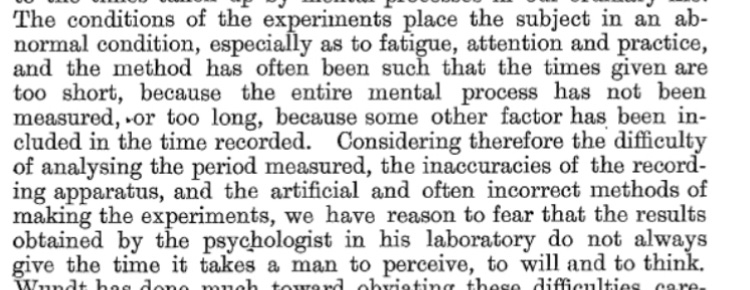In his legacy video David Pearson discussed the idea of “context” as an intellectual organizer for the history of research in the field of reading. Individuals who have learned to read recognize a letter faster when the letter is presented in a word than when it is presented in isolation. The smallest particles of the text become more quickly seen when in the context of other small particles than when solitary.
Still today we seek to understand the role of context in reading, though the small particles have gotten increasingly bigger—and David segments the history of the field into eras based on what questions about the interplay between context and particles for readers dominated the discussion.
David describes James Cattell at work in his laboratory in Germany, 1886, the first person ever to receive a PhD in Psychology, and I can see David in the picture of Cattell’s lab with him. Indeed, the immense impact Cattell had on the field as a catalyst for research is reflected in what David has accomplished.
In his paper from 1886 Cattell pivoted from his narrow question of fact to much broader questions of method and meaning:
David, of course, had the time to perceive, to will, and to think about Cattell and those who came later. I’d like to know more about the ways in which David’s vast knowledge of the history of research impacts his thinking in the moment at any given time.
How is his knowledge organized? Is his memory keyed to figures in research? I suspect it is to some degree. To particular pieces or lines of research that changed the field? I think so. To his own prolific research? Absolutely. To courses that he took or taught? I don’t know. How much did his undergraduate work as a history major contribute to his mindset as a contemplative researcher? Fascinating question to me. What is the proper role of history in the academic preparation of a reading scholar going forward? What is the outline of a historical narrative that might give classroom teachers more solid footing on the ground as the reading wars heat up again?
I know this is the season to break away from the intense and demanding work of preparing our young people for their future. I’ll keep my posts to a minimum to honor this time and will aim to post a podcast conversation with David sometime in January. If you’re not comfortable posting a comment or question publicly, please shoot me an email.
Thank you for the part you play in bringing the gift of literacy to our kids.



These are great questions Terry. I am intrigued by the following two:
• How is his knowledge organized?
• What is the outline of a historical narrative that might give classroom teachers more solid footing on the ground as the reading wars heat up again?
I think what's missing for us is *perspective*. For example, it seems like few educators remember Reading First's failures. These types of lessons might better balance the debates we have today. This feels especially important with how social media is designed to reward and accentuate the negative.